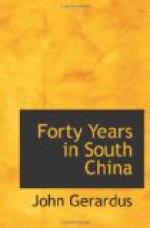In regard to keeping the Church pure in doctrine:
“Sure I am that the Church in China cannot be kept pure by legislation on this, the opposite side of the globe. But we expect Christ to reign over and the Holy Spirit to be given to the Churches, and the proper ecclesiastical bodies formed of them in China, as well as in this land. Why not? Such are the promises of God. The way to secure these things is by prayer and the preaching of the pure Gospel, not by legislation. Let the Church be careful in her selection of missionaries. Send only such as she has confidence in-men of God, sound in faith, apt to teach-and then trust them, or recall them. Don’t attempt to control them contrary to their judgment. Strange if this, which is so much insisted on as the policy of our Church, be right, that she cannot get a single man, of all she sends out to China, to think so. Can it be that the missionary work is so subversive of right reason, or of correct judgment, or of conscientiousness, that all become perverted by engaging in it?
“2. Another supposed advantage is the effect it will have in enlisting the sympathies of the Church in behalf of the Mission at Amoy. Our people do not first ask whether it be building ourselves up, before they sympathize with a benevolent object. We believe the contrary is the exact truth. It requires a liberal policy to call forth liberal views and actions. As regards the enlisting of men, look at the facts. Every man who has gone out from among you to engage in this missionary work begs of you not to adopt a narrow policy. So in regard to obtaining of funds. Usually the men who are most liberal in giving are most liberal in feeling.
.... “However powerful the motive addressed to the desire to build up our own Church, there are motives infinitely more powerful. Such are the motives to be depended upon in endeavoring to elevate the standard of liberality among our people. If our people have not yet learned, they should be taught to engage in the work of evangelizing the world, not for the sake of our Church in America, but for the sake of Christ and His Church, and when the Church thus built up is like our own they should be fully satisfied. We believe they will be satisfied with this.




